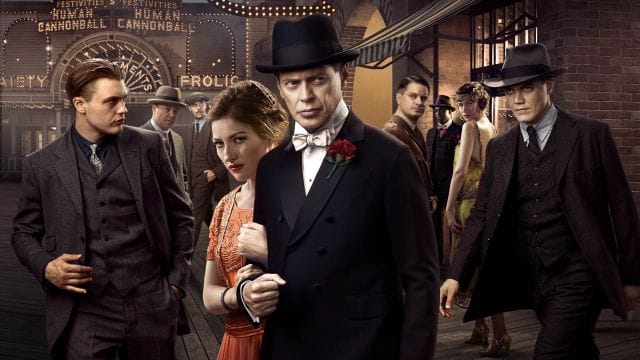Episodes: Mistaken protagonist syndrome and you

My review of Vinyl will appear Friday, and I'll likely talk a bit about this there. It's a show I like a fair amount, but it's also a show that shares something with creator Terrence Winter's previous series, Boardwalk Empire: mistaken protagonist syndrome.
Mistaken protagonist syndrome, simply put, is when a show decides that its protagonist is the biggest star, or the character who's most like other protagonists on TV, or something similar, when the actual weight of the story is on one (or several) of the other characters. Particularly as the antihero era of the 2000s gave way to the era we're in right now, there were lots of shows where the creators were clearly more interested in everybody around the white guy at the center, but they weren't quite sure how to not be about the white guy at the center.
Mad Men is actually a pretty good example of this, both because it didn't actually have it (Don Draper was fascinating, and he had an interesting story of his own) and because it had sort of an incipient version of it (in that Peggy, Pete, Joan, etc., etc., were all as interesting, if not moreso at various points, but probably wouldn't have been the lead of a show like this at the time). But it was also a show that understood that you needed more than a character who behaved badly at your center to have a shot at making lasting television.
Boardwalk Empire was a show I enjoyed quite a bit, but it was also a show that never once figured out what the central story about Nucky Thompson was supposed to be. He was already the king when the series began, and he only further consolidated his power as the show went on. He didn't have the existential journey of a Tony Soprano, nor did he have an overriding plot goal. He just wanted to keep things pretty much the way they were, especially once he ended up with Margaret.
That's murder to drama, which thrives on change, on needing to keep pushing forward, on either a thematic or plot level. To Boardwalk's credit, essentially every other character had some major character arc going on as the series went on, from Margaret to Jimmy to Chalky to even Van Alden. And then these characters would seemingly race past Nucky, while he bobbed along, but the show would keep expending effort on following him around.
To Vinyl's credit, it doesn't quite have that big of an issue, both because Bobby Cannavale is a more natural fit as a record label executive than Steve Buscemi was as a cold-blooded gangster, and because his character actually has something of an arc (he wants to move past the sounds of the past and find sounds of the future, which is at least a goal).
But it's hard to escape the notion that basically everything he goes through in the first few episodes is something where his struggles aren't as real as many of the other characters, particularly Juno Temple as a young woman who wants to prove her worth as a talent scout and ends up being sort of a Peggy Olsen of punk. Hell, even Ray Romano has a more obvious character arc, and he's basically just playing "old white guy who isn't sure if his best days are behind him," a character as old as drama itself.
What's difficult to escape when you think about mistaken protagonist syndrome is how often it goes hand in hand with Hollywood's fear about telling stories not about white dudes. This doesn't mean that stories about white dudes can't be electrifying and great (I mean, Better Call Saul is coming back the night after Vinyl, and it's tremendously fun); it does mean that they usually have a higher bar to clear in getting us to invest, because the TV grid is filled with so many other shows that have done it all before.
But just from a storytelling perspective, the stories we tell about white guys in the US tend to be stories where they don't have a lot to gain, because they're already relatively powerful and affluent. It's not like we're telling stories about blue collar people (though we should be doing this more often), or about religious zealots, or anything like that. The people who head up our TV shows and films tend to look a lot like the people who head up Hollywood studios, because that's what they gravitate toward.
The weird thing about mistaken protagonist syndrome is at once how easy it is to fix and how hard. Presumably, all you need to do is look at your script and say, "Hey, this isn't as interesting as what this character is going through." But by the time you get to that point, everybody involved probably assumes the main character is going to be a certain person, and it might be too late to adjust. Mistaken protagonist syndrome, then, needs to be fixed at the conceptualization stage, and that's the place where Hollywood's tendency to tell the same old stories about the same old characters is the most entrenched. It's not impossible to fix, but it's easy to fall into old patterns.
--
Episodes is published at least three times per week, and more if I feel like it. It is mostly about television, except when it's not. Suggest topics for future installments via email or on Twitter. Read more of my work at Vox Dot Com.




